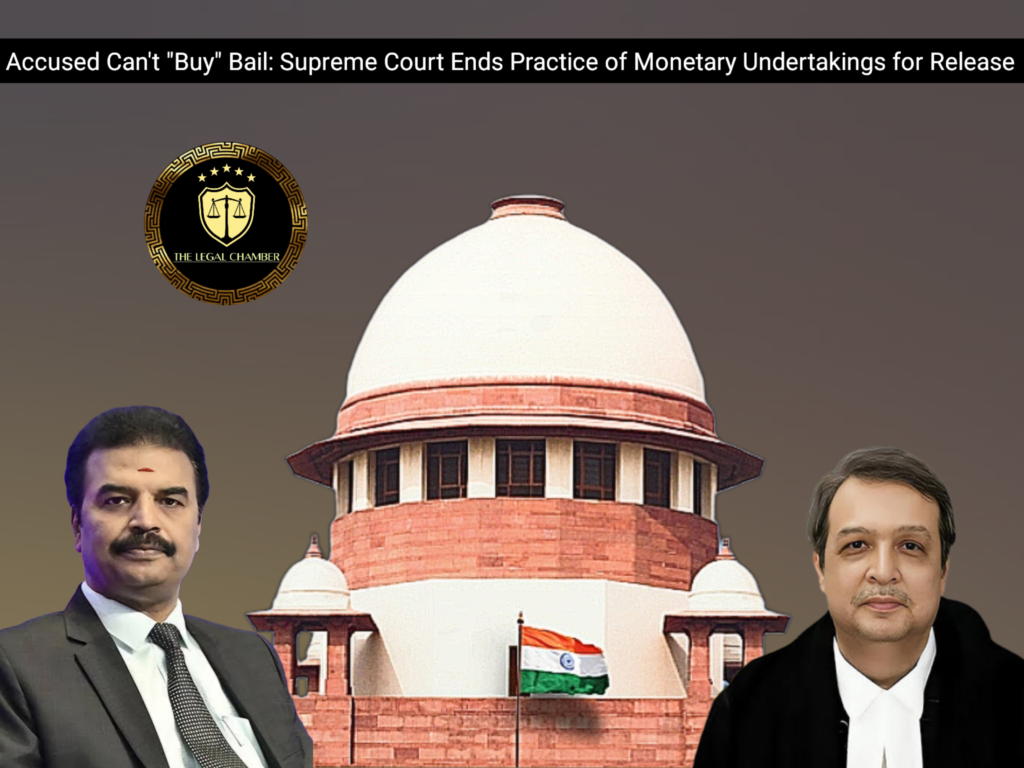
This Supreme Court judgment prohibits courts from granting bail based on monetary undertakings or deposits by the accused. It directs that all bail applications must be decided strictly on their own merits, in accordance with law, and not on any extraneous promises of payment. The practice of imposing financial conditions for bail deprecated to uphold the integrity of the judicial process.
Facts Of The Case:
The appellant, Gajanan Gore, was arrested in August 2023 for allegedly siphoning approximately ₹1.6 crore from his employer, an advertising and training institute. He was charged with various offences including cheating and forgery under the Indian Penal Code. After the Trial Court denied him bail, the Bombay High Court granted him bail in April 2024. This bail was contingent on a key condition: that he deposit ₹25 lakhs in the court, based on a specific affidavit-cum-undertaking he had voluntarily filed. However, after securing his release, the appellant failed to deposit the promised amount. Consequently, the original complainant filed an application for cancellation of bail. The High Court, finding that the appellant had reneged on his solemn undertaking, which was the sole basis for the bail order, cancelled his bail in July 2025 and directed him to surrender. The appellant then appealed this cancellation order to the Supreme Court.
Procedural History:
The procedural history of this case began with the appellant’s arrest in August 2023 and the subsequent denial of regular bail by the Trial Court. He then filed Criminal Bail Application No. 445/2024 before the Bombay High Court, which granted him bail in April 2024 based on his voluntary undertaking to deposit ₹25 lakhs. After he failed to comply with this condition, the original complainant filed Interim Application No. 4524/2024 seeking cancellation of bail. The High Court allowed this application in July 2025, cancelling the bail and ordering the appellant to surrender. The appellant then filed a petition for special leave to appeal (Crl.) No. 10749/2025 before the Supreme Court, which granted leave and, upon hearing the criminal appeal, dismissed it and upheld the High Court’s order.
READ ALSO:Supreme Court Judgment: Banks Can Classify MSME Loans as NPA Without Prior “Stress Identification”
Court Observation:
The Court strongly deprecated the practice of granting bail based on monetary undertakings, observing that such conditions are impermissible as they transform the court into a recovery agent. It held that bail applications must be decided strictly on their own merits under the provisions of the law, such as Chapter XXXIII of the CrPC (now BNSS), and not on any extraneous promises of payment. The bench condemned the appellant’s conduct for approbating and reprobating—first securing liberty by giving an undertaking and then resiling from it—which constituted a gross abuse of the judicial process and undermined the dignity of the court.
Final Decision & Judgement:
The Supreme Court dismissed the appeal and upheld the Bombay High Court’s order cancelling the appellant’s bail. It imposed costs of ₹50,000 on the appellant for gross abuse of the process of law. The Court further issued a directive prohibiting all courts from granting bail based on any undertaking to deposit money, mandating that such pleas must be decided strictly on their merits. It clarified that upon surrender, the appellant could file a fresh bail application, which must be considered solely on its own merits and in accordance with law.
Case Details:
Case Title: Gajanan Dattatray Gore vs. The State of Maharashtra & Anr. Citation: 2025 INSC 913 Criminal Appeal No.: Criminal Appeal No. 3219 of 2025 Date of Judgement: 28th July, 2025 Judges/Justice Name: Justice J.B. Pardiwala and Justice R. Mahadevan
Download The Judgement Here